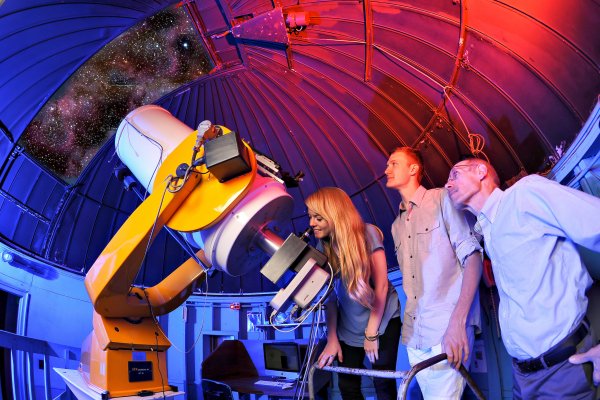Hunting for the Higgs
Jay Dittmann, Ph.D.
Class of 1992
Associate Professor of Physics, Baylor University
Waco, Texas
Professor Jay Dittmann ’93 Ph.D., began researching elementary particle physics under the guidance of his professors at Valpo. Two decades later, Professor Dittmann’s scientific work on that subject may revolutionize the world of physics.
Professor Dittmann is now an associate professor of physics at Baylor University, where he leads the school’s experimental high-energy physics group. In 2008,Professor Dittmann became involved with the search for the Higgs boson particle, along with several postdoctoral research associates and graduate students.
“The Higgs boson was predicted to exist in 1964 by Peter Higgs, a theoretical physicist,”Professor Dittmann explains. “Its discovery is likened to finding a missing puzzle piece, and it helps explain how elementary particles in the universe acquire their mass. For nearly 50 years, physicists searched earnestly for some sign of this particle in nature.”
Though the search for the Higgs boson has been a driving force for physics research, scientists had never found a particle that fit the predictions — until 2012. That year,Professor Dittmann and his colleagues discovered a new elementary particle, which could turn out to be the long-sought Higgs boson. The discovery was made at the European Center for Nuclear Research (CERN) in Geneva, Switzerland.
“It is clear that we have discovered a new elementary particle, but much more data is needed to be sure that this new particle exactly matches the properties of the particle as predicted by Peter Higgs in 1964,”Professor Dittmann says. “If it is indeed the Higgs, it is arguably one of the most important scientific discoveries of our time.”
Professor Dittmann and his team continue to search for data to confirm that this new particle is, in fact, the Higgs boson. In addition, they are probing other scientific questions, including the origin of dark matter and the existence of Supersymmetry, a theory that could provide an explanation of dark matter.
Professor Dittmann says that his experiences as a physics and math double-major at Valpo have led directly to his career success.
“At Valpo, I learned the fundamentals of physics, which got me into grad school. But that’s just part of the story — more importantly, I had wonderful faculty role models who demonstrated how to be a scientist and a Christian simultaneously,” he says. “Furthermore, they helped me to realize my love of teaching.”
Professor Dittmann also met his wife, Jeanne (Zuhn ’92), at Valpo and developed lasting relationships with friends, faculty, and staff.
“Jeanne and I loved our experience as undergraduates,” Professor Dittmann says. “I encourage all undergraduate students to pursue their education passionately. It’s really worth it to work hard. Be impressive.”
